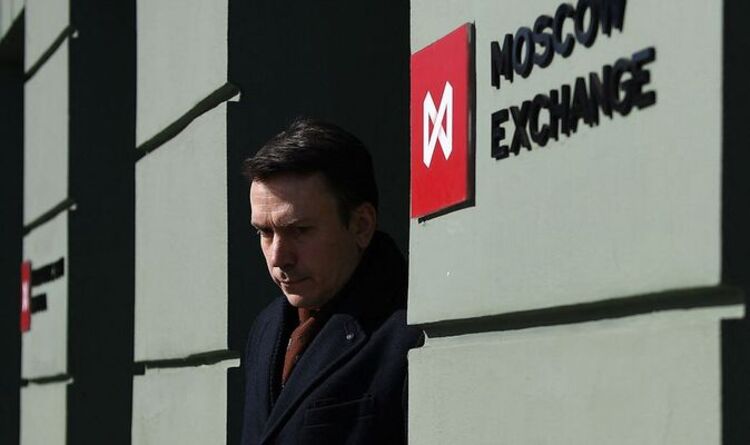Desperate Russia tries to turn tide as shares continue to tumble
Russian ruble falls to all-time low following economic sanctions
We use your sign-up to provide content in ways you’ve consented to and to improve our understanding of you. This may include adverts from us and 3rd parties based on our understanding. You can unsubscribe at any time. More info
After being shuttered for nearly a month since the invasion of Ukraine, Russia’s Moscow Exchange began a cautious reopening last week. Markets had remained closed after shares collapsed around 45 percent at the start of the invasion – with the Bank of Russia keen to prevent a market crash. Despite an initial gain on opening on March 24, fears of a sell off look set to continue with prices falling the following day. On Monday, losses continued with the IMOEX index of Russia’s largest companies down over two percent.
Energy giant Gazprom saw its share price fall nearly four percent, taking total losses to -13 percent since markets reopened.
Russia’s largest lender Sberbank saw a drop of nearly five percent as trading resumed on Monday.
While showing declines, the Moscow Exchange is still far from a full market crash thanks to heavy manipulation by the central bank.
Roman Ziruk, market analyst at Ebury, said: “The current picture of the Russian market is significantly distorted by a variety of measures introduced to stem the sell-off including a temporary ban on equity sales by non-residents and a short-selling ban.


“This suggests prices are higher than they ought to be and they naturally should move towards their actual value.
“We could be witnessing that right now as prices turn lower again.”
So far, Russia has been extremely cautious about reopening, with trading still limited to a short daily window from 09:50 to 13:50 Moscow time for shares.
“The first thing to note on Russian shares at this point is that they no longer represent a real and functioning market,” explained Craig Erlam, senior market analyst at OANDA.

He added: “While there has been some losses over the last couple of sessions, it’s relatively small as investors know that foreigners can’t sell, no one can short and if they fall far, the authorities will swoop in.
“There’s not much urgency for domestic investors even if the companies themselves look in turmoil.”
The long term picture remains unclear, with a number of the Bank of Russia’s measures unlikely to prove sustainable.
In particular the current ban on foreign investors selling stocks is set to come to an end on April 1.
DON’T MISS:
Historic change as NatWest returns to majority private control [LATEST]
Bank of England warns of shock from energy prices [REVEAL]
Oil prices fall as Shanghai enters lockdown [INSIGHT]

Mr Ziruk predicted there could be “another bout of sell-off if investors will indeed be able to cash out.”
In the UK, firms with a London Stock Exchange listing such as Gazprom saw share prices freefall before eventually being suspended from trading.
Source: Read Full Article

